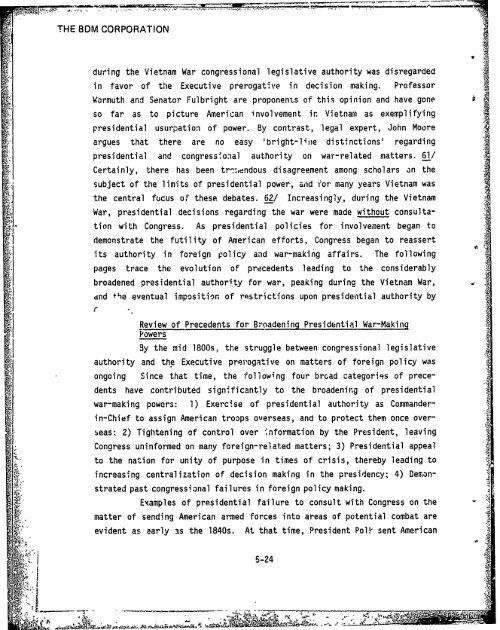policy - The Black Vault
policy - The Black Vault
policy - The Black Vault
You also want an ePaper? Increase the reach of your titles
YUMPU automatically turns print PDFs into web optimized ePapers that Google loves.
THE BDM CORPORATION<br />
Jseas:<br />
-r•<br />
during the Vietnam War congressional legislative authority was disregarded<br />
in favor of the Executive prerogative in decision making. Professor<br />
Wormuth and Senator Fulbright are proponents of this opinion and have gone<br />
so far as to picture American involvement ir Vietnam as exemplifying<br />
presidential usurpation of power. By contrast, legal expert, John Moore<br />
argues that there are no easy 'bright-line distinctions' regarding<br />
presidential and congressioual authority on war-related matters. 61/<br />
Certainly, there has been tr-.•,endous disagreement among scholars on the<br />
subject of the limits of presidential power, and for many years Vietnam was<br />
the central focus o, these debates. 62/ Increasingly, during the Vietnam<br />
War, presidential decisions regarding the war were made without consultation<br />
with Congress. As presidential policies for involvement began to<br />
demonstrate the futility of American efforts, Congress began to reassert<br />
its authority in foreign <strong>policy</strong> and war-making affairs. <strong>The</strong> following<br />
pages trace the evolution of precedents leading to the considerably<br />
broadened presidential authority for war, peaking during the Vietnam War,<br />
dnd t he eventual imposition of restrictions upon presidential authority by<br />
r<br />
Review of Precedents for Broadening Presidential War-Making<br />
Powers<br />
By the mid 1800s. the struggle between congressional legislative<br />
authority and the Executive prerogative on matters of foreign <strong>policy</strong> was<br />
ongoing Since that time, the following four broad categories of precedents<br />
have contributed significantly to the broadening of presidential<br />
war-making powers: 1) Exercise of presidential authority as Commanderin-Chief<br />
to assign American troops overseas, and to protect them once over-<br />
2) Tightening of control over information by the President, leaving<br />
Congress uninformed on many foreign-related matters; 3) Presidential appeal<br />
to the nation for unity of purpose in times of crisis, thereby leading to<br />
increasing centralization of decision making in the presidency: 4) Demonstrated<br />
past congressional failures in foreign <strong>policy</strong> making.<br />
Examples of presidential failure to consult with Congress on the<br />
matter of sending American armed forces into areas of potential combat are<br />
evident as early as the 1840s. At that time, President PoWv sent American<br />
J<br />
'~~' J -24<br />
-4- ... •<br />
•.• - -• -<br />
;1k AAS~
















